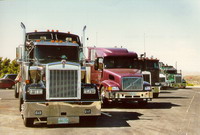America concerned about Mexican-plated trucks delivering cargo all over country
The American truckers, environmentalists and politicians are alarmed about the potential dangers of allowing Mexican tractor-trailers onto U.S. interstate highways.

Teamsters union members have waged angry protests at the border and on Capitol Hill, waving signs saying "NAFTA Kills" and "Unsafe Mexican Trucks."
But more than 1,000 south-of-the-border companies are already allowed to drive cargo beyond the border zone under a long-standing exemption to the U.S. moratorium on Mexican long-haul trucking.
And these Mexican drivers and trucks have had better driver and vehicle safety records than their U.S. counterparts in recent years, according to the U.S. Department of Transportation - although opponents say many violations never get recorded because of sloppy government record-keeping.
"We are the same as they are. They think that we drink beer, use drugs and drive without sleeping, but this is not true," said Luis Gonzalez, a trucker based in Monterrey, Mexico, between long-haul trips north of the border.
Gonzalez, 38, has spent seven years hauling cargo direct from Mexico to hundreds of destinations in about 30 U.S. states.
"We have respected the laws here for many years," Gonzalez said, yelling into a handsfree cell phone over the roar of the road while driving a load of construction steel to Virginia in his American-made 2007 Freightliner.
Opening the highways has long been a goal of both the United States and Mexico. Promoters say it will create new business opportunities on both sides of the border and make international trade more efficient. Trucks were supposed to begin rolling both ways in 2000 under the North American Free Trade Agreement, but interest groups in the U.S. blocked it.
Since the moratorium was imposed in 1982, all nonexempt Mexican truckers have had to transfer their loads within 25 miles of the border. In Arizona, the limit is 75 miles. U.S. trucks then drive the goods to their final destination.
U.S. companies have invested millions of dollars in the business of transferring these goods, and U.S. haulers fear companies will replace them with less-expensive Mexican carriers.
But the Federal Motor Carrier Safety Administration has gone ahead with a yearlong pilot program that will allow up to 100 U.S. and Mexican companies to deliver goods directly to points deep inside the neighboring country.
Every Mexican truck entered in the pilot program must be reviewed by U.S. inspectors to make sure it complies with U.S. driving rules and safety standards. Those that pass get a safety decal. "U.S. trucks can operate for many many years without having a safety decal and never be inspected," FMCSA administrator John Hill told The Associated Press in a telephone interview.
Mexico has 1,309 trucking companies that are exempt from the 1982 moratorium - some because they have sister companiesnorth of the border. Gonzalez has driven for Transportes Olympic in Mexico and Olympic Transport in the U.S.
While other carriers pay expensive transfer fees, the biggest obstacle for Gonzalez's company has been paperwork. The pilot program reduces that paperwork, which is what convinced Gonzalez's boss, Fernando Paez, to take advantage of it. Gonzalez was the first truck driver to participate.
Of the exempted companies, 859 were active from 2003 to 2006, and their drivers and trucks were subject to U.S. inspections for violations that would put them out of service until corrected. The "out-of-service" rates for long-haul Mexican trucks was 21.3 percent, compared to 23.5 percent for U.S. trucks, and the rate for Mexican drivers was 1.2 percent compared to 7 percent for U.S. drivers, said FMCSA communications chief Melissa Mazzella DeLaney.
Opponents of the program are not buying it.
"We simply think they're making stuff up as they go along," said Todd Spencer, executive vice president of the U.S.-based Owner-Operator Independent Drivers Association.
Spencer said he has seen transportation department data showing Mexican carriers with brake defects or bald tires that were not put out of service, and he points to an August report from the department's inspector general's office citing a backlog of 40,000 citations against Mexican trucks in Texas that were never put into the state's database.
"That's the quality of the data," he said. "If there is nothing reported, that doesn't mean everything is hunky dory."
The opposition also claims the department hasn't shown how it will ensure thorough background checks and drug testing, enforce limits on driving time, or prohibit Mexican trucks from moving goods between U.S. states.
The August inspector general's report also cited a lack of coordinated plans for inspecting Mexican trucks. But the report noted that the agency has taken corrective action.
So far, the pilot program includes five Mexican companies and 15 trucks, along with three U.S. companies owning 30 trucks. At least one of these U.S. trucks has begun shipping deep into Mexico.
But both houses of Congress have proposed eliminating the pilot program's funding from a still-unreconciled transportation bill. And many truckers on both sides seem hesitant to drive far across the border.
Mexican truckers say they're at a competitive disadvantage, and want help from the governments to reduce traffic at border crossings. And many U.S. truckers aren't willing to risk a drive deep into foreign territory.
There are "too many unknowns for them: everything from insurance to crime" and the language barrier, said Randy Grider, editor of the U.S.-based industry magazine Truckers News. "Lost in the hubbub of the cross-border controversy is the fact that very few carriers or drivers in either country have shown interest in actually participating."
Subscribe to Pravda.Ru Telegram channel, Facebook, RSS!





